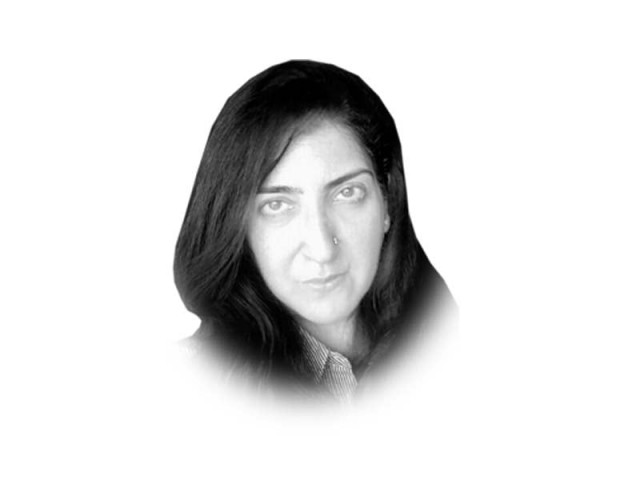Words are not bridges
Can words for Indo-Pak amity singe with the honesty of writers who spoke against their own country?

Anybody watching the disgusting display of musical warfare of mere desh ki ladaai versus mere watan ki izzat on the reality show “Sur-Kshetra” will realise that it burns in the glare of animosity. That apart, in what can only be termed sado-masochism, after the show viewers are urged to take refuge beneath the shade of poems or slogans “to use words as bridges to build peace and friendship between India and Pakistan”. It is disappointing that the Aman ki Asha initiative chose to get involved in such pugilism.
Write a few words for peace, send them to the TV channel and win a grand prize — to attend the finale in Dubai. Can irony be more telling than that your borderless thoughts will be rewarded in a third country?
India and Pakistan have a common civilisation, but not the same culture anymore. Culture is not a fossil stuck in 1947. Instead of fantasising about how the Berlin Wall came tumbling down (the breakup of Germany was anyway the result of occupation and part of the Cold War), we should pay more attention to the USSR split. Mikhail Gorbachev’s glasnost achieved little.
The point is, why don’t we address peace within? Where are the aman initiatives by Pakistan in Balochistan or by India with the North East states? Think about the number of movements seeking to assert themselves on the basis of the words they speak.
Does Urdu, the first language of Pakistan, unite people? Regionalism is rife in many parts of the country and politicians have ensured that it remains so. Much of the cultural activity in Urdu is confined to Lahore and Karachi. In Punjab, people speak in Punjabi, in Khyber-Pakhtunkhwa it is Pashto, in Sindh it is Sindhi. It might be pertinent to point out that these regions add their flavour to Urdu. Even the mohajir Pervez Musharraf spoke in a Punjabi Urdu accent, probably to connect with the largely Punjabi armed forces or, more likely, the epicureans in the havelis. And who can forget that the MQM had objected to Ahmed Faraz holding a position in the National Book Trust because he was a Pathan and Urdu, they felt, was their fiefdom?
Now, the TV channel asks, “Kya aapke paas hai woh shabd, jo mitaa sakey dilon ke beech khinchi sarhadon ki lakeerein?” (Do you have words that can erase the lines drawn between hearts?). It forgets that there are little Indias that won’t even talk to one another because their identity rests on resisting a national language. The Biblical twist the Wagah balladeers have given to our respective obsessions with the neighbour camouflages pressing internal factionalism.
Linguistic activism is not new. You will find it seeking an anchor in blood-soaked chapters recreating the past. These were the rebels. When people say that Saadat Hassan Manto and Ismat Chughtai were ahead of their time, it is precisely because they broke the language barrier. Here, language does not refer merely to a set of words; it is another voice, another way of expressing. In India and Pakistan, there were writers from the Progressive Movement and their verses and stories dripped with ideas of dissent. They were scathing about their own country, writing about the tumult, the dictatorial policies. Their honesty scalded. Can words thrown in the wind for amity singe with a similar truth?
History has tales of profanation. Messiahs and prophets, too, went against established customs. Then, why can we not accept the reality of animus, which is less damaging than the cover-up job? Peace endeavours invariably use the ‘time gone by’ nostalgia, even if it is to kill the dead and lay it to rest. Why should the mirror not show the cracks, and reflect the gunshots, the wounds?
One of the compulsions arises from not wanting to change society’s outlook but only to soften the stance. Visiting each other under ‘controlled’ circumstances cannot be justified as having universal appeal. To what purpose are such efforts when they strive to be solely a defiance of formula, not of essence? A parallel consciousness is not an awakening.
Some mistakenly see such ‘peace with words’ efforts as the much-touted trade ties. This form of trade has taken place for years. It was never packaged as quasi diplomacy. Branded institutional attempts cater to a limited group. Where are the families of the people separated by the birth of the countries? Where are the words of solace for those waiting in long queues, filling up visa forms, and uncertain whether they would be approved to meet those they share their genes with?
It is not just a strip of land that splits us. I am often asked: Why did your ancestors not leave for Pakistan? I have no answer, for we never posed that query, just as one does not ask why one is born.
I still have family in Pakistan, remnants of people I never got to know. Except for one — my khala, my mother’s younger sister. She left almost three decades after Partition with her Indian husband. Words connected the families. One line telegrams that lied about illness so that she could visit; later, there would be the recounting of anecdotes about different cities, different homes, different walls. My cousins spoke in Urdu. They sounded like characters from their tele-serials. “Ankahee”. The unspoken. Word bridges can never cover distances unless the river it is built over flows.
Published in The Express Tribune, October 27th, 2012.















COMMENTS
Comments are moderated and generally will be posted if they are on-topic and not abusive.
For more information, please see our Comments FAQ